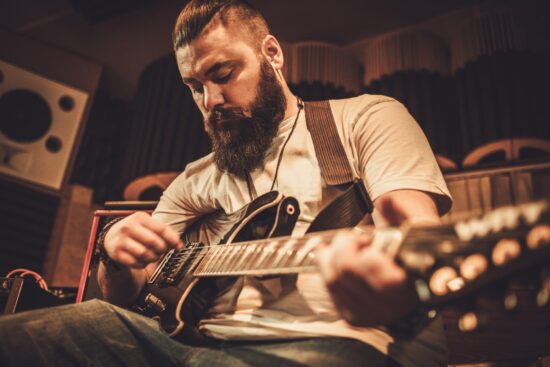You might have spent dozens of hours at home making demos but going into the studio is a whole other ballgame.
Home recordings are forgiving, and demos are a little rough around the edges by design. Going into a real studio with a real engineer and producer is a gigantic step up, and you’ll be expected to perform at a much higher level. After all, this is going to be the final form for many of your songs – why not make them sound as good as possible, right?
Lucky for you, you’re not the first guitarist to go into the studio. You have decades of other people’s mistakes to learn from to give yourself the best chance to be the best thing on your band’s recording.
Here are our four biggest tips for making sure you’re the standout and not the sticking point when your band hits record.
Know what you want to sound like ahead of time
This is a mistake a lot of beginner bands make. You have the amp that your favorite guitarist plays, you have your pedal collection you’ve cobbled together, you go into the practice room and turn everything to 10 and figure the wall of noise sounds great!
Then you get into the studio and realize that when you listen to your tone under a microscope, it’s really not what you were going for. This is especially true for the guys with the big pedal boards, where things sound good with a huge wash of reverb, but once you dial it back to give everything space on a recording, you’re not hearing what you want.
Spend some time alone at home playing your parts at bedroom volume, and really focus on making sure the guitar tone (at bedroom volume) is what you would want on a record. Make sure the amp is going to give you the amp tone you want, make sure your pedals are what you need and in the right order (sites like KillerGuitarRigs.com have loads of info on pedal order and the like), make sure you’re selecting the right pickup for each part.
In short, go in there knowing exactly what your gear sounds like, take the time to dial it in on the day, and then focus on the performance.
Be open minded
The number one thing you need to do going into the studio is to be ready and open to change. Your band will have written the best song you can as a unit, and often going into the studio with a producer means getting an extra set of ears from someone whose job it is to make the song the best it can be. Sometimes that can mean minor changes, sometimes it can mean overhauling the song completely.
If you go into the studio with the opinion that your parts are set in stone, or that the song is finished, you’re going to become a barrier to the producer doing their job. Take every suggestion, roll with it, give it your best shot, and be ready to be pleasantly surprised as your song reaches its full potential.
Know Your Parts Inside Out
While it’s important to be open to change, it’s also important to be ready to give the best possible performance when the red light is on. Practicing with your band every night isn’t enough, you need to sit alone and practice your own parts until you can play them without even paying attention.
The real danger here is if you’re not confident in your parts, if they aren’t fluent under your fingers, you’ll get into the studio and get “red light fever”, where you psych yourself out and can’t play your parts to save your life. It’s a nerve-wracking experience, but it happens to everyone from time to time.
The best way to avoid this – know your parts so well that you don’t even have to think about them. That way, when the time comes, you can concentrate on the performance instead of trying to make sure you just get your parts right.
Get your gear in studio condition
The best thing you can do to make a session move along smoothly is to make sure all of your gear is ready for the scrutiny of the studio. What might sound “gloriously loose” live or in a practice room just sounds out of tune when you’re recording in the studio.
Make sure none of your pedals buzz, make sure your amp isn’t picking up the radio, make sure your guitar is set up by a professional and has no intonation issues or dead spots.
Make sure you show up sounding good and ready to be the best thing on the record.
Conclusion – Have fun!
The key goal here is to eliminate as many distractions as possible so the studio can be a fun and creative time for your band. If all your gear is good, and you know your parts and sounds, all you have to do on the day is show up, be open minded, and focus on giving the best performance you possibly can. It’s your music, make it something to be proud of.
- Article written by Brian of KillerGuitarRigs.com









